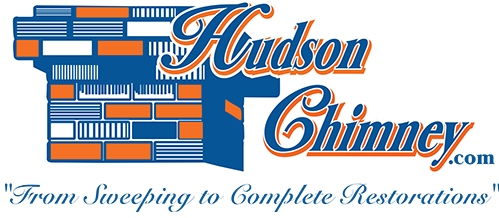by Mark Hudson | Nov 30, 2014 | Ash Disposal
If you have a wood burning chimney, you may be unsure of how to properly and safely dispose of the remaining ash in your firebox. You may also be unsure as to how often you should have your fireplace and chimney professionally cleaned. The experts at Hudson Chimney have the expertise and skill necessary to answer all of your questions regarding your fireplace and chimney as well as to clean and help you maintain and repair your chimney.
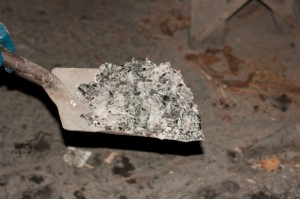
When you are emptying your firebox of ash, it is important that you protect your hands from leftover embers by wearing leather gloves. Use a metal scoop to transfer the ash from your firebox to a metal bucket and add a little water. Place the bucket in a location away from any combustible materials (outside the home is best), and let it sit. It is also a good idea to use the metal scoop to mix the ash and break up any chunks before you let it sit. According to The National Garden Association, the ash can be used as a fertilizer for your gardens. However, this is not the case when you burn cardboard, treated wood, or painted wood, which create toxic ash and should not be burned in the first place, as they also release toxic fumes when they are burned.
When you do remove ash from your firebox, according to the Chimney Safety Institute of America, it is beneficial to leave some of the ash. The CSIA recommends that you leave a layer of ash that is one inch thick on the bottom of your firebox in order to make building and maintaining a fire easier, create hotter fires, and protect the floor of you firebox. However, it is still important to clean your firebox because leaving more than a one inch layer can lead to the premature burn out of your grate as well as decrease the amount of fuel you can add to your fire. If you do leave a layer of ash, make sure to remove this layer at the end of chimney season, when you will no longer be using your chimney.
It is also important to have your chimney cleaned by a professional at least once a year. Only a professional can thoroughly clean your chimney as well as remove all of the creosote that has built up. Creosote, which is very flammable, is created as a byproduct of wood burning fires when hot smoke and gases hit the cool sides of your chimney. It is important to have creosote professionally removed so it does not build up into glazed creosote, which can only be removed from your chimney with chemicals.
Call Hudson Chimney if you have any questions about the proper disposal of ash or if you have not had your chimney cleaned yet this year. The experts there have the skill to provide you with a clean, safe, and efficient chimney for the winter.
by Mark Hudson | Nov 15, 2014 | Firewood
If you have a wood burning appliance, then you have more control than you probably think over the way your appliance runs. The type of wood you burn influences how efficiently your chimney runs in addition to the overall health of your chimney. It is important, then, that you choose to burn seasoned firewood. According to the National Chimney Safety Institute of America, burning seasoned firewood will allow your appliance to burn cleaner and more efficiently than burning unseasoned firewood. In fact, whether or not your firewood is seasoned is far more important than the species of wood you burn.
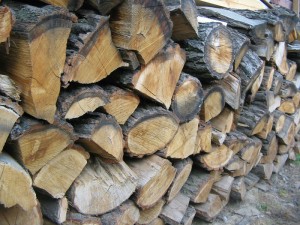
You may be wondering what the difference is between seasoned and unseasoned firewood as well as why this difference is important. All wood has a certain amount of water in it. Seasoned firewood has moisture content of 20 to 25 percent while unseasoned wood can have a moisture content of up to 45 percent. Burning unseasoned wood is inefficient because energy is lost to drying the wood before burning it, leading to a lower heat output. Not only this, but burning unseasoned wood also leads to more creosote build up in your chimney or stovepipe.
In order to make sure that your firewood is seasoned if you chop it yourself, cut it to length at least six months before using it. Splitting and cutting the firewood to its proper length gives the wood more exposure to the sun and wind, allowing evaporation to occur. If you buy your firewood, it is good to buy it the spring before you use it to ensure that it is well seasoned. However, if you buy your firewood close to the time you burn it there are several ways to tell if the firewood you are buying is seasoned. Check to make sure that the ends of the firewood are cracked and darkened and that the wood is light and makes a “clunking” noise when two pieces are hit together. Unseasoned firewood will be heavier.
The way you store your wood is also important to the way it will burn. If your firewood is exposed to snow and rain, it will absorb too much water to burn properly and possibly rot. Store your wood off of the ground and cover it in the case of bad weather. Leave it uncovered on sunny days to allow evaporation to occur.
When burning wood, make sure that you do not burn wood that has been painted or treated, which can cause toxic fumes to be released into your home. Also, if you end up burning unseasoned wood, it is important that you have your chimney or stovepipe frequently cleaned and inspected to avoid hazardous creosote build up.
If you are unsure about the type of wood you should be burning in your fireplace, ask an expert at Hudson Chimney during your annual chimney cleaning and inspection. The professionals at Hudson Chimney have the knowledge and training to help you determine the best choices for your chimney in order that it run efficiently and safely.
by Mark Hudson | Oct 28, 2014 | carbon monoxide
When a professional inspects your chimney, he or she looks for a number of problems that could cause damage to your chimney or home as well as potential safety hazards. One of these hazards is carbon monoxide, which can cause health problems, including permanent brain and organ damage, to you and your loved ones in low doses and death in high doses. For this and other reasons, it is recommended by the Chimney Safety Institute of America that your chimney be serviced professionally at least once a year.
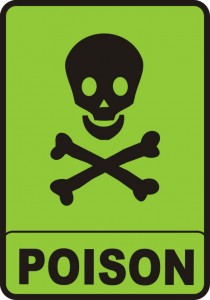
The easiest preventative measure against carbon monoxide leaks is to have your chimney cleaned in addition to its inspection by a professional. If you have a woodburning appliance, you have to be careful of creosote buildup in your chimney. Creosote is extremely combustible, making it a fire hazard. In addition to this, it builds up to the point where it will prevent proper ventilation of your appliance, not only causing it to become inefficient but allowing toxic gases such as carbon monoxide to stay in your home. An annual cleaning can prevent creosote build up. In addition to this, make sure you only burn seasoned cordwood. Burning unseasoned wood leads to additional creosote build up.
No matter the type of appliance you have, your chimney or stovepipe must be clear of all debris to ensure proper ventilation and the expulsion of carbon monoxide from your home. An annual inspection can help to ensure that your chimney or pipe is clear of such debris. Another way to prevent chimney blockage is to have a professional install a chimney cap. Not only does a chimney cap prevent water damage to your chimney and home, but it prevents animals and environmental debris from entering your chimney and blocking carbon monoxide from exiting your home.
If you have an oil or gas burning appliance, you still have to worry about carbon monoxide, even if it is not a direct byproduct of combustion. Oil flues must be cleared of soot in order to prevent blockage, while the flues of gas burning appliances are subject to corrosive circumstances. According to the Chimney Safety Institute of America, such appliances should be inspected regularly to ensure that toxic fumes such as carbon monoxide are allowed out of the house as well as to prevent carbon monoxide from becoming trapped inside of the home.
If you have not recently had your chimney inspected or cleaned, call Hudson Chimney. Their professionals are trained and certified to make sure that your appliance is safe to run and works efficiently to heat your home. They will be sure that you and your loved ones are safe from the dangers of carbon monoxide poisoning by thoroughly cleaning your flue as well as checking to make sure your appliance is in proper order for the cold winter months. In addition, if you think that you or a loved one is suffering from carbon monoxide poisoning, it is imperative to seek out medical attention as quickly as possible.
by Mark Hudson | Oct 15, 2014 | Chimney Cap
Does your chimney have a cap? A chimney cap may seem insignificant and maybe not that important, but it serves a variety of functions to protect your chimney and home! The Chimney Safety Institute of America suggests that all chimneys have caps as a preventative measure against damage and for safety reasons. If you do not have a chimney cap or your chimney cap needs to be replaced, it is important that you call Hudson Chimney as soon as possible to install a cap in order to prevent the damages associated with not owning one.
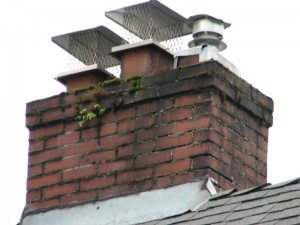
There are many reasons why it is important to keep your chimney capped. A chimney cap stops rain from getting into your chimney, preventing water damage to both your chimney and your home. Water damage can cost you a lot of money in repairs as well as destroy your chimney if not confronted quickly. While a chimney cap is important to preventing water from entering your chimney, water damage can also be prevented by having the professionals at Hudson Chimney apply a sealant to the exterior of your chimney.
A chimney cap also keeps animals out of your chimney, which can create noise, smells, and provide them an entrance into your home. Chimney caps prevent environmental debris, such as sticks and leaves, from entering your chimney as well, which can cause dangerous chimney fires. Having debris or animals in your chimney can also block smoke and fumes from efficiently leaving your chimney, which will lead to improper ventilation that will not allow dangerous fumes to exit your home. Because they prevent things from entering and blocking your chimney, chimney caps ensure that your chimney’s air flow runs efficiently. Chimney caps also help to eliminate downdrafts, which blow cold air as well as fumes from your fire back into your home. A chimney cap also protects your chimney liner and prevents sparks from flying out of your chimney and lighting things on fire.
If you are looking for a sturdy and durable chimney cap that doesn’t rust, Hudson Chimney can install a stainless steel cap for you. However, you also have the options of having a copper, galvanized, or aluminum cap installed. Consult with an expert at Hudson Chimney to determine the best cap for your chimney. No matter your choice, chimney caps are one of the least expensive chimney repairs that can be made as well as one of the simplest. Therefore, it makes financial sense to have a chimney cap installed rather than waiting for damages to occur that will cost you more!
So if you don’t have a chimney cap or if your chimney cap needs to be replaced, give Hudson Chimney a call as soon as possible. The professionals there will be sure that you have a cap installed that will protect your chimney and home.
by Mark Hudson | Sep 30, 2014 | CSIA Certified
When looking for a chimney sweep to entrust with the task of cleaning and inspecting your chimney, you may wonder how you are supposed to distinguish a good chimney sweep from a bad one. After all, you want to hire a professional who knows what he or she is doing and who can help you to protect your home from the dangers that owning a chimney can present. The Chimney Safety Institute of America is a non-profit organization that reviews and certifies chimney sweep companies in order to provide homeowners with a standard for their chimney needs.
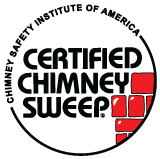
To be CSIA certified, a chimney technician must attend a review session and pass an exam covering Successful Chimney Sweeping (2011), National Fire Protection Agency 211 (2013), and the 2006 International Residential Code. Anyone applying for certification must also sign the CSIA code of ethics and pay an annual fee. In order to remain certified, this process must be repeated by the technician every three years.
These procedures for certification create a method for homeowners to determine if a chimney sweep is qualified to clean and inspect a chimney in a professional and informed manner. Chimneys and appliances can cause fires and carbon monoxide leaks if not properly maintained. Therefore, making sure your chimney sweep knows what he or she is doing in addition to being dedicated to helping you detect and fix potential problems is of the utmost importance.
It is significant to note that the CSIA not only seeks to educate and evaluate technicians, but also to provide an ethical code for professionals to follow. When technicians sign this code, they pledge to conduct business in an honest and fair manner, as well as to remain knowledgeable and up to date on all chimney standards and procedures. They also agree to do their best to educate you, the consumer, and to act in a professional and respectful manner.
Hudson Chimney is certified by the CSIA, so you can be sure that you will be in good hands. The technicians at Hudson Chimney have been servicing the Jacksonville, Florida Area for over thirty years, ensuring their clients clean, safe, and warm homes with efficient heating systems. You can trust the professionals at Hudson Chimney to be knowledgeable in their skills and to provide you and your appliances with service of the highest quality.
If you have any questions about CSIA certification or policies, or if you have any questions about chimneys and appliances as a homeowner, be sure to check out CSIA.org for more information. Their website is an informative and reliable resource of educational material for your benefit.
Also, if your chimney has not been serviced this year yet, schedule an appointment with a technician at Hudson Chimney as soon as possible. The fall and winter are busy for any chimney servicing company, and the sooner you call, the more likely your home will be prepared for the colder winter months. The professionals at Hudson Chimney will make sure your chimney is prepared!
